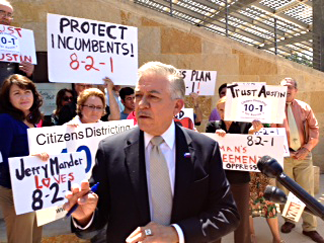Elections
Profile: Doug Greco for mayor
First-ever opportunity to elect appraisal board members
They’re off and running for council
Feisty Debate Over How to Elect Council
One panelist argues for no change to the
at-large system for City Council elections
by Ken Martin
© The Austin Bulldog 2012
Posted Thursday, October 4, 2012 6:40pm
The University of Texas Law School provided the venue for a fourth public debate over the question of whether—or even if—the Austin City Charter should be amended to allow for some form of geographic representation on the Austin City Council.
 The September 28 debate was emceed by Sherri Greenberg, a former state representative who is director of UT’s Center for Politics and Governance at the LBJ School of Public Affairs.
The September 28 debate was emceed by Sherri Greenberg, a former state representative who is director of UT’s Center for Politics and Governance at the LBJ School of Public Affairs.
All five panelists were members of the 2012 Charter Revision Committee that voted by a narrow 8-7 majority to recommend that 10 council members be elected from geographic districts and only the mayor continue to be elected at-large, that is by all voters.
 Ken Rigsbee, an independent oil and energy professional, voted to recommend the 10-1 plan and explained why. “It looked to me like the Charter Revision Committee would have a tie vote, after six months of arguing and debating,” he said. “I voted for 10-1. That doesn’t mean I wanted it—I just wanted to stop the meetings.”
Ken Rigsbee, an independent oil and energy professional, voted to recommend the 10-1 plan and explained why. “It looked to me like the Charter Revision Committee would have a tie vote, after six months of arguing and debating,” he said. “I voted for 10-1. That doesn’t mean I wanted it—I just wanted to stop the meetings.”
Rigsbee said he told Mayor Lee Leffingwell, who nominated him to serve on the Charter Revision Committee, “I said, ‘Lee, what is it about ‘no’ you don’t understand?’
He was referring to the fact that the voters of Austin had six opportunities between 1973 and 2002 to adopt geographic representation and the majority had always voted no.
“Is it worth spending $2 million for 11 council members vice seven, to force political horse-trading between council members?” Rigsbee asked. “Is it really imperative we do that? My answer is no.” (The city’s assessment of fiscal impact for the four additional council members and their staffs under Propositions 3 or 4 calls for $888,350 for construction and build-out for the additional offices, and an additional ongoing annual cost of $1,396,000 a year.)
The other panelists all agree that the at-large system in use since 1953 must be changed, but disagree on how to do that.
Propositions 3 and 4 Proponents Rev Campaigns
Raising money, organizing troops, and pushing plans
for geographic representation on Austin City Council
by Ken Martin
© The Austin Bulldog 2012
Posted Friday, September 28, 2012 2:39pm
The proponents of Proposition 3—Austinites for Geographic Representation (AGR)—got a huge head start in a grassroots campaign to win voter approval for geographic representation on the Austin City Council. They started meeting in February last year, waged a successful petition drive to get on the ballot, and have built a broad coalition of supporters, including 29 organizations and numerous community leaders. (For a list of endorsements, click here.)
The advocates for Proposition 4—Austin Community for Change (AC4C)—are pushing a different plan for geographic representation. They are running from behind and hoping to raise enough money to convince voters they have the best plan. They have rapidly built a list of 19 community organizations supporting their plan as well as individual community supporters. (For a list of endorsements, click here.)
Both AGR and AC4C have websites loaded with information touting their respective plans but there's a striking visual difference.
The banner atop the AGR pages contains a montage of nine photos taken at various Austin events.
The AC4C page headers show a photo purchased from iStockphoto.com titled “Diverse group casually dressed people looking up.”
Redistricting Need Not Be a Quintessentially Political Process
Quintessentially Political Process
Independent redistricting commissions for U.S. states and cities
Posted Monday, October September 24, 2012 6:05pm
Editor's introduction: Over the past 36 years attorney Steve Bickerstaff, adjunct professor at the University Of Texas School Of Law, has represented more than 100 jurisdictions on redistricting matters, including during the redistricting process, or before the U.S. Department of Justice, or in state or federal courts. These jurisdictions include the State of Texas (in three different decades) and various local governments (cities, counties, school districts, community colleges and special districts) in Texas and elsewhere. The electoral systems of these jurisdictions have included wholly at-large, wholly single-member, and hybrid or mixed (partially at-large) election structures.
He is author of Lines in the Sand (2007), a book about the controversial 2003 congressional redistricting in Texas; co-author of International Election Principles (2009); and author of 25 law journal articles dealing primarily with election law and telecommunications regulation.
Bickerstaff wrote the initial draft for the nonpartisan Citizens Independent Redistricting Commission. The Commission is an integral part of Proposition 3, which was put on the ballot through a petition drive conducted by Austinites for Geographic Representation. Bickerstaff’s draft was based on the Voters First Act, which through initiative and referendum established a system of independent redistricting in the State of California.
It is important that Austin voters have a thorough understanding of the Citizens Independent Redistricting Commission before casting ballots in the November 6 election. To that end, The Austin Bulldog is publishing Bickerstaff’s scholarly study of the strengths and weaknesses of various systems used for redistricting throughout the nation.
 Much has been written about the use of redistricting commissions for redrawing state legislative and congressional district lines. Twenty- two states now have some form of commission. However, the nature, jurisdiction and importance of these commissions vary greatly. By contrast, virtually nothing has been written about the use of redistricting commissions at the local level of government. This is particularly surprising because virtually all large and middle-size U.S. cities use at least some election districts that must be redrawn every 10 years, and because most of these cities are home-rule jurisdictions that generally have broad legal authority to adopt their own process for drawing local election district boundaries.[1] A purpose of this article is to provide government officials, public interest activists, and attorneys with a means for assessing the value of a municipal redistricting commission and for designing such commission to take self-interest and bias out of a process in which they have no legitimate role.[2]
Much has been written about the use of redistricting commissions for redrawing state legislative and congressional district lines. Twenty- two states now have some form of commission. However, the nature, jurisdiction and importance of these commissions vary greatly. By contrast, virtually nothing has been written about the use of redistricting commissions at the local level of government. This is particularly surprising because virtually all large and middle-size U.S. cities use at least some election districts that must be redrawn every 10 years, and because most of these cities are home-rule jurisdictions that generally have broad legal authority to adopt their own process for drawing local election district boundaries.[1] A purpose of this article is to provide government officials, public interest activists, and attorneys with a means for assessing the value of a municipal redistricting commission and for designing such commission to take self-interest and bias out of a process in which they have no legitimate role.[2]
Barrientos Lampoons Prop 4 With a Fable
Other proponents of alternative plans for
geographic representation push their points
by Ken Martin
© The Austin Bulldog 2012
Posted Friday, September 14, 2012 3:07pm
 The passion and political experience of retired State Senator Gonzalo Barrientos (D-Austin) lifted the crowd of some 40 interested citizens who had come to hear a debate about what system should govern how Austin City Council members are elected.
The passion and political experience of retired State Senator Gonzalo Barrientos (D-Austin) lifted the crowd of some 40 interested citizens who had come to hear a debate about what system should govern how Austin City Council members are elected.Scene: A debate forum hosted by Southwest Key’s VOTA! Campaign at the organization’s headquarters in far East Austin.
Enter Barrientos: arriving 20 minutes after the program started and a bit flustered from being stuck in traffic.
When his turn to speak came, the former lawmaker drew on his storytelling ability to attack the council’s action to put the 8-2-1 plan (Proposition 4) on the same ballot with the citizens’ 10-1 initiative (Proposition 3).
“In the time of Christ,” he said, “there were two stores on the opposite side of a street. The owners didn’t like each other.
Proposition 3 Advocates Falsely Slam RECA
Proposition 3 Advocates Falsely Accuse RECA
Group alleges ‘rumor’ of $100,000 pledge by Real Estate
Council to defeat Proposition 3, but RECA says not so
by Ken Martin
© The Austin Bulldog 2012
Posted Wednesday, September 12, 2012 10:25pm
An e-mail received early this morning from Austinites for Geographic Representation (AGR), that was titled "A Very Stinky Rumor" turned out to be stinky indeed—as in false.
Or so says the Real Estate Council of Austin.
The AGR e-mail stated, "Rumors are flying that large real estate investors at the Real Estate Council of Austin (RECA) just pledged $100,000 to stop Prop 3—the people's plan for geographic representation—by running a confusion game with Prop 4."







